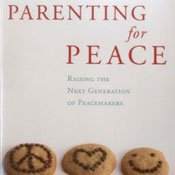"Parenting for Peace: Raising the Next Generation of Peacemakers" by Dr. Marcy Axness (Sentient Publications, 2012, $18.95) offers a fascinating look into new research ranging from brain chemistry to human growth and development. Axness' book provides theoretical and practical advice for raising children who are strong, flexible and ready to take on the future. Her book also gives parents ample opportunities for panic attacks.
The underlying concept of "Parenting for Peace" is that the way average Americans parent does not allow for the optimal brain development children need to face the increasingly complex challenges of our world.
To raise resilient children who will survive and thrive, Axness outlines the ideal situation for kids: They should have physically and psychologically healthy parents or primary caregivers who take good care of themselves, eat organic foods, and drink plenty of filtered water. Parents should never spank or shame their children; scientists have shown that these activities are harmful to brain development.
The children should experience high-quality, nonacademic early childhood education and never watch television. Parents should read their children lots of stories with beautiful illustrations that celebrate the wholeness of the human form. Children should grow up in an environment that is free of toxins, negativity and excessive material possessions.
This is all well and good, and many of these guidelines are ones that I personally have come to intuitively (and in moderation) practice on my own terms as a parent. But the approach Axness takes—despite her insistence in the introduction and the epilogue of the book that her intention isn't to cause guilt—may be fear-inducing for the average parent.
For example, the author reveals that "there is a relatively newly discovered biological phenomenon called genomic imprinting, through which a mother's experience of her environment—as downloaded via stress or pleasure hormones, for example—begins shaping the development of her child as early as ovulation." Furthermore, "parents' stress during the early years can leave an imprint on their children's genes."
Basically, Axness describes again and again how parents can royally screw up their children, starting before they are even born.
Now, I would never in a million years spank my son. We build lots of "forts," put together slews of puzzles, read stacks of stories and run around in the sunshine in our pesticide-free front yard all the time. He goes to a great preschool. We eat a lot of broccoli, but I can't afford organic raspberries. Last week, I fed my son Chick-fil-A waffle fries, and last night we watched an episode of "Curious George" before bath time. Am I permanently damaging my child's brain?
If you can avoid feeling overwhelmed by the author's earnest journey toward parenting perfection, then you will find this book an excellent guide for a gradual shift into more enlightened parenting. However, it's probably not crucial to chart the attitudes toward child-rearing over the last three generations of your family tree to become more aware of your strengths and weaknesses as a parent.
You can walk away from "Parenting for Peace" with helpful and straightforward parenting tips. For instance, Axness offers a useful anagram, PARENTS—Presence, Awareness, Rhythm, Example, Nurturance, Trust, Simplicity—which outlines important elements within a matrix of developmental milestones from conception to college.
From infancy, she says, it is important for children to be able to trust their parents to experience healthy development. Axness offers specific ways to encourage a trusting, healthy parent-child relationship at all ages. Mindfulness is another key ingredient for the author, as brain-tissue volume decreases when our minds are on autopilot. By simply slowing down and being more present and "in the moment" with your child—even during a diaper change or bath time or homework—you are helping your own brain as well as your child's.
Even if you've already missed the boat for starting at the very beginning and meticulously preparing your body to welcome a new life—personally, my favorite morning-sickness cure was Little Caesar's Hot and Ready cheese pizzas—you can still get a bevy of practical parenting advice backed up by the latest scientific research from "Parenting for Peace."
The author writes, "We choose daily to become who we will be tomorrow." In other words, choose to take care of yourself and to simplify your life. Nurture your child with books, bubbles, healthy food, hugs, gentle discipline and understanding.
My advice: Take this book with a big helping of coarse gray sea salt. Take what you realistically need away from it. If you can afford organic produce, great. If not, don't sweat it. Because after all, your stress over your budget could change your child's genes.
Find out more about Axness and "Parenting for Peace" and read an excerpt from the book at http://www.marcyaxness.com.
Takeaways
• Prepare healthy foods
• Drink lots of water
• Cultivate gratitude
• Pick positive role models
• Reduce parental stress
• Practice mindfulness
• Nourish yourself first
• Create community
• Emphasize the importance of play
• Choose classic, non-electronic toys
• Foster creativity
• Don't fear boredom
• Model patient problem-solving
• Speak calmly
• Practice positive discipline
• Encourage independent thinking
• Allow your children to learn from their mistakes
• Read lots of stories
• Develop meaningful family traditions


